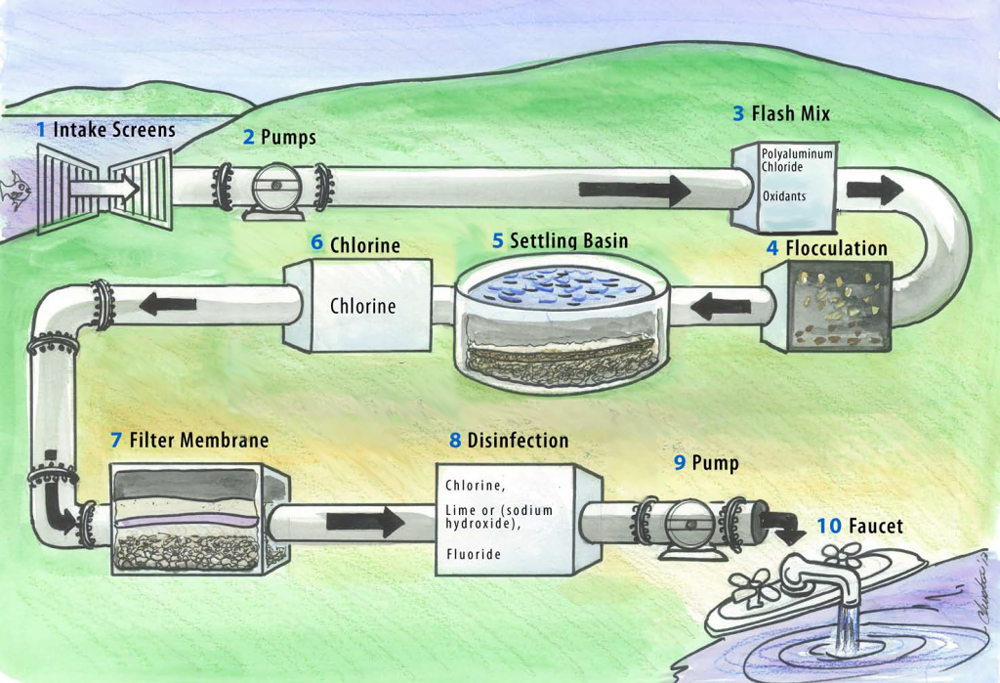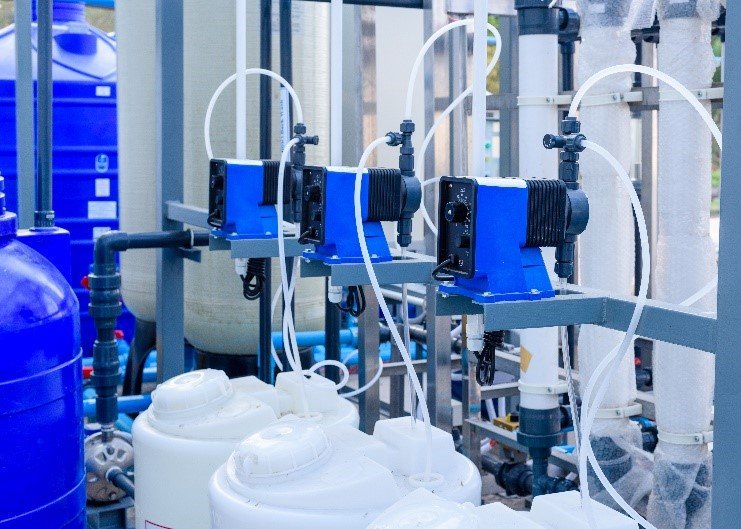Checking Out Water Technology Startups: How They Change Sustainable Solutions
Water Technology startups are becoming essential players in the quest for lasting remedies to global water issues. These business take advantage of cutting-edge modern technologies to improve water efficiency and management. Their contributions deal with pressing difficulties such as deficiency and contamination. Regardless of their capacity, they deal with various barriers that might impact their success. Recognizing these dynamics clarifies the future of water sustainability and the function these startups might play in shaping it.
The Relevance of Water Technology in Today's World
As international water shortage increases, the significance of water Technology becomes increasingly evident. Water Technology plays an essential role in addressing the challenges postured by diminishing freshwater sources and boosting need. It encompasses a broad series of advancements, consisting of advanced filtration systems, wastewater therapy modern technologies, and clever irrigation solutions. These innovations not just boost the performance of water use but additionally promote sustainable techniques across numerous sectors, consisting of agriculture, sector, and metropolitan development.
Furthermore, the value of water Technology prolongs beyond source monitoring. It promotes strength versus environment change influences, such as floodings and droughts, by offering flexible services for water conservation and management. Furthermore, it sustains public health and wellness by ensuring accessibility to tidy and risk-free alcohol consumption water. As the globe faces growing water-related difficulties, the combination of innovative water modern technologies is essential for fostering lasting development and securing water schedule for future generations.
Innovative Solutions From Water Tech Startups
While typical approaches to water administration have actually served their function, a new age of water technology start-ups is revolutionizing the market with cutting-edge solutions (Water Technology Startups). These companies take advantage of sophisticated innovations to deal with pressing water problems, such as scarcity, contamination, and ineffective circulation. Lots of startups use expert system and machine knowing to optimize water use and forecast need, leading to even more lasting techniques
Additionally, several firms focus on developing advanced filtration systems that get rid of pollutants and make water safe for consumption. Others discover decentralized water treatment technologies, allowing neighborhoods to handle their water resources better. Additionally, some start-ups are pioneering smart watering remedies that decrease water waste in farming, promoting environmental conservation.
Instance Studies: Effective Water Technology Startups
Countless water Technology startups have become leaders in dealing with international water challenges with ingenious strategies. One notable instance is Xylem, which concentrates on water analytics and smart facilities to optimize water usage and reduce waste. Their options have actually been carried out in numerous municipalities, showing substantial enhancements in water administration efficiency.
An additional effective startup, No Mass Water, has actually developed solar-powered hydropanels that draw out water vapor from the air, supplying sustainable drinking water in dry areas. Water Technology Startups. This Technology has been deployed in numerous countries, making sure neighborhoods have accessibility to tidy water
AquaVenture Holdings runs a varied portfolio of water-as-a-service solutions, addressing water scarcity through desalination and wastewater therapy. Their jobs have actually proven necessary in areas encountering severe water shortages, showcasing the capacity of innovative water technologies to create enduring, positive effects. These study highlight the transformative possibility of start-ups in the water Technology industry.
The Function of Smart Technology in Water Administration
Smart Technology plays an essential role in modern-day water monitoring by leveraging IoT applications to maximize source use. Information analytics improves effectiveness by offering actionable insights, while remote monitoring solutions allow real-time oversight of water systems. Together, these technologies change exactly how water is handled, promoting sustainability and functional efficiency.
IoT Applications in Water
As water shortage and management obstacles intensify around the world, the integration of Net of Points (IoT) applications has become a pivotal solution in maximizing water resources. IoT Technology assists in real-time monitoring and evaluation of water systems, enabling more reliable usage and management. Sensing units released in various water facilities can track top quality, flow prices, and leak, providing important data to stakeholders. This information empowers energies and consumers to make enlightened choices, lowering waste and improving conservation initiatives. Furthermore, smart watering systems use IoT to optimize water distribution for agriculture, making certain that crops obtain the correct amount of water at the correct time. Generally, IoT applications are changing traditional water administration techniques, fostering sustainability and strength in water resource systems.
Information Analytics for Performance
Using data analytics is crucial for improving efficiency in water monitoring. Water Technology startups are increasingly utilizing sophisticated analytics to optimize source allocation and decrease waste. By assessing data from various sources, these startups can identify patterns and patterns that educate far better decision-making. Predictive analytics can forecast water demand, allowing utilities to change supply appropriately, thereby decreasing surpluses and shortages. Additionally, real-time data processing allows the prompt detection of leaks and ineffectiveness within circulation systems, significantly lowering operational costs. Data-driven understandings empower stakeholders to implement targeted preservation strategies, fostering lasting techniques. Essentially, incorporating information analytics right into water administration not just streamlines procedures but additionally advertises long-lasting sustainability in water resource use.
Remote Tracking Solutions
While traditional water monitoring systems commonly deal with inefficiencies, remote tracking solutions are transforming how water resources are taken care of. These ingenious technologies make it possible for real-time data collection and analysis, allowing stakeholders to keep track of water quality, circulation rates, and use patterns from afar. Making use of sensors and IoT devices, remote surveillance provides immediate understandings that help with aggressive decision-making. This shift not just boosts functional performance however additionally advertises sustainability by decreasing water waste and optimizing source allocation. In addition, remote monitoring systems can recognize potential concerns before they rise, thereby minimizing the danger of contamination or framework failing. As water Technology startups remain to establish these solutions, the market is positioned for significant advancements in sustainable water administration practices.
Difficulties Encountering Water Technology Startups
Water Technology startups come across substantial difficulties this hyperlink that can prevent their growth and success. Trick problems consist of protecting appropriate funding, maneuvering with complicated governing settings, and completing in a crowded industry. These challenges require strategic planning and advancement to conquer.
Financing and Investment Hurdles
Although advancement in water Technology holds immense capacity for addressing global challenges, startups in this market usually face considerable funding and investment obstacles. Lots of investors stay mindful, regarding the water market as high-risk due to its complex governing landscape and lengthy development timelines. Furthermore, startups typically battle to show immediate profitability, which can deter possible backers. Typical endeavor funding may forget water innovation, preferring industries with quicker returns, such as technology or durable goods. Safeguarding grants and federal government funding can be competitive and taxing, additional making complex monetary stability. Because of this, several ingenious water Technology start-ups discover themselves in a precarious placement, needing imaginative funding techniques to browse these monetary obstacles and achieve their objectives
Regulatory Conformity Issues
Steering regulatory compliance is a considerable challenge for startups in the water Technology industry, as they have to come to grips with a myriad of local, national, and international policies. These laws often encompass water quality standards, environmental security laws, and security protocols, which can differ extensively across jurisdictions. Start-ups may discover it hard to browse this facility landscape, particularly when scaling operations or getting in brand-new markets. The costs related to conformity can be substantial, diverting resources away from advancement and item development. Furthermore, hold-ups in acquiring necessary authorizations or certifications can prevent growth and market entry. Consequently, a robust understanding of governing structures is crucial for these startups to guarantee lasting operations and stay clear of possible lawful effects.
Market Competition Dynamics
As water Technology start-ups arise in an affordable landscape, they deal with many difficulties look at this site that can hamper their growth and development. Developed companies often dominate the marketplace, leveraging sources and experience to preserve their positions. Startups have problem with minimal financing, which restricts study and growth abilities, making it challenging to compete on Technology and rates. In addition, the quickly progressing nature of water modern technologies needs continuous adaptation, more straining startup sources. Regulative difficulties can make complex market entrance, as conformity with environmental criteria is important yet expensive. Finally, drawing in experienced talent in a specific niche area presents one more obstacle, as larger companies may supply more appealing employment plans. Consequently, these elements develop a complex atmosphere for water Technology start-ups aiming to be successful.

The Future of Water Technology and Sustainability

The future of water Technology will likely concentrate on incorporating expert system and information analytics to enhance water circulation and usage patterns. By harnessing real-time information, business can forecast shortages and take care of resources much more efficiently. Moreover, lasting methods will come to be a keystone of the market, encouraging round economic situations where water is recycled and treated. Eventually, the continued advancement of water Technology will be crucial in creating durable infrastructures with the ability of satisfying the difficulties postured by climate adjustment and population development while promoting ecological stewardship.
Often Asked Questions
What Are the Key Metrics for Examining Water Technology Startups?
Secret metrics for evaluating water Technology start-ups include market potential, scalability, client acquisition expenses, earnings growth, technology innovation, governing compliance, ecological influence, affordable advantage, and group knowledge, all essential for establishing lasting viability and success.
Exactly How Can People Assistance Water Technology Innovations?
Individuals can support water Technology developments by investing in startups, advocating for policy modifications, joining neighborhood campaigns, sharing expertise about sustainable techniques, and promoting awareness of water problems with social media sites and neighborhood events.
What Prevail Funding Resources for Water Technology Startups?
Usual financing resources for water technology startups include venture funding, federal government grants, crowdfunding systems, angel investors, and corporate collaborations. These monetary opportunities assist assist in advancement website here and advancement in lasting water monitoring modern technologies.

Which Industries Benefit Most From Water Technology Advancements?
Industries such as farming, energy, manufacturing, and municipal solutions benefit considerably from water Technology innovations. These technologies improve water efficiency, reduce prices, and advertise lasting practices, inevitably adding to environmental conservation and source administration.
Are There Any Kind Of Regulative Challenges Certain to Water Modern Technology?
Yes, water Technology encounters governing difficulties, consisting of conformity with environmental requirements, permitting procedures, and differing regional regulations. These intricacies can impede advancement and slow the application of brand-new innovations in the water monitoring industry.
Water Technology start-ups are emerging as essential players in the mission for sustainable options to international water problems. As global water shortage magnifies, the importance of water Technology ends up being increasingly evident. Others check out decentralized water treatment innovations, permitting neighborhoods to handle their water resources a lot more effectively. One more effective startup, No Mass Water, has developed solar-powered hydropanels that extract water vapor from the air, providing sustainable drinking water in dry areas. Their jobs have actually confirmed essential in regions dealing with extreme water lacks, showcasing the possibility of cutting-edge water technologies to create enduring, positive impacts.